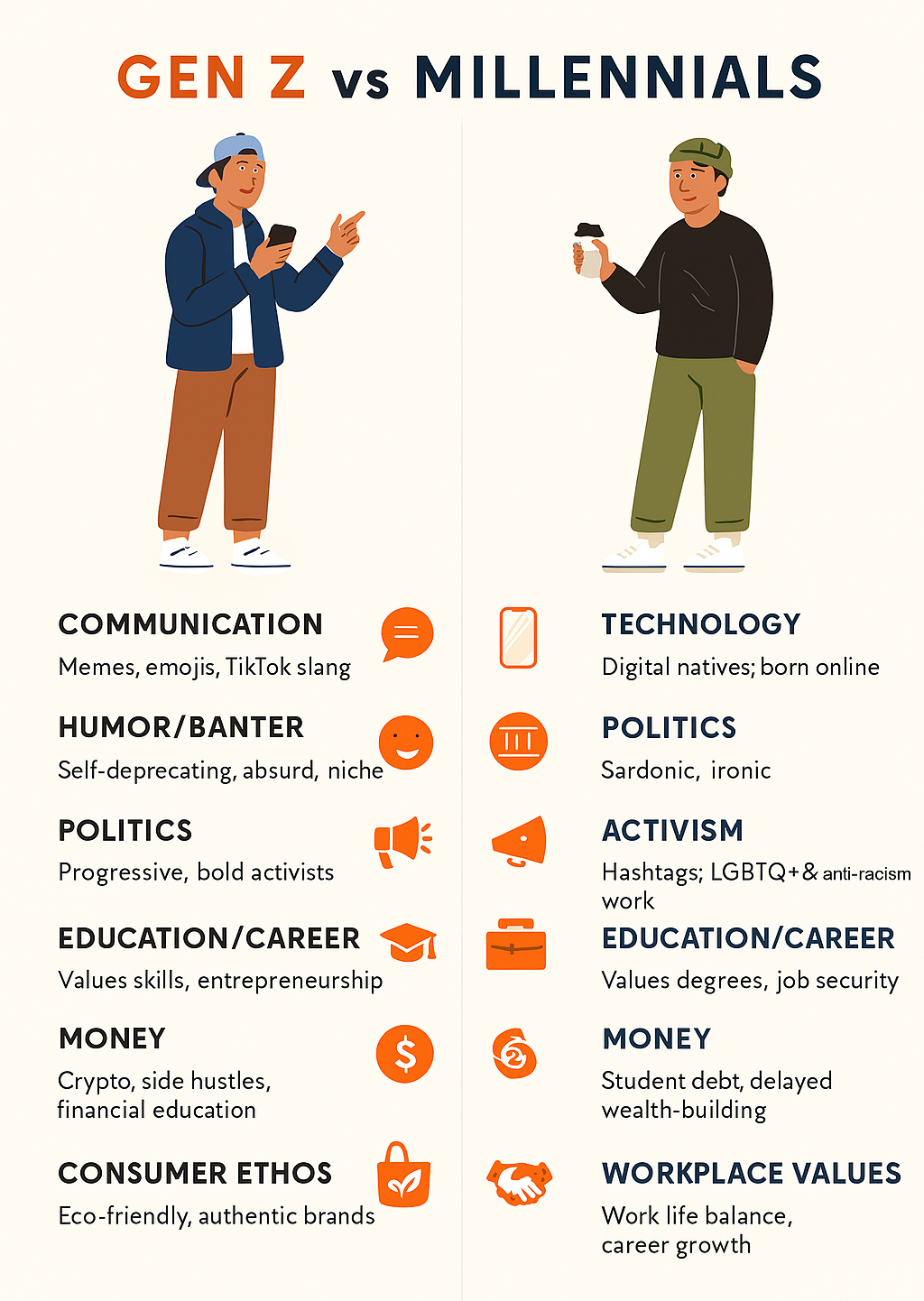
Every few decades, new generations emerge with fresh ideas, attitudes, and lifestyles that challenge the status quo. Today, two such generations dominate the cultural and professional landscape, Millennials (born roughly between 1981 and 1996) and Generation Z (born between 1997 and 2012). Though they often share the same spaces, social media platforms, workplaces, and online activism, their values, humor, and approaches to life differ significantly. Understanding the nuances between them not only helps bridge the generational gap but also sheds light on where society might be heading next.
Gen Z and Millennials may be close in age, but they diverge sharply in humor, politics, and work ethics. This blog explores how each generation expresses itself, engages with the world, and navigates the workplace, with vivid examples and cultural references that bring these differences to life.
“Gen Z vs Millennials” isn’t just a meme war, it’s a cultural fault line. While both generations are digital natives shaped by rapid technological change, their values, communication styles, and worldviews differ in striking ways. Millennials came of age during the rise of social media and economic instability. Gen Z grew up in a hyper-connected, post-truth world marked by climate anxiety, meme culture, and political polarization.
This article unpacks the differences between Gen Z and Millennials across three key dimensions: humor, politics, and work ethics, with real-world examples to make the comparison vivid and relatable.
Humor: Absurdism vs Irony
Perhaps the most visible divide between Millennials and Gen Z lies in their humor. Millennials grew up during the rise of the internet meme era, when jokes were clever, reference-heavy, and often centered around nostalgia or sarcasm. Think of “The Office” quotes, pop culture references from the early 2000s, and the endless stream of relatable humor about student loans and avocado toast. Their humor often has a narrative element, a beginning, middle, and punchline, reflecting their connection to the early blog and YouTube culture.
Gen Z humor, on the other hand, thrives on chaos. Born into the age of TikTok, fast memes, and algorithm-driven content, Gen Z jokes are short, surreal, and often seemingly meaningless at first glance. A Gen Z meme might involve a frog dancing to distorted audio or a random caption like “me when capitalism.” The absurdity itself is the joke. This shift in humor reflects the generation’s relationship with an oversaturated internet and their tendency to find laughter in existential confusion rather than structured storytelling.
Example: A Millennial might laugh at a meme saying, “Me trying to pay rent and student loans with one paycheck.” A Gen Z user might instead share a looping TikTok of a raccoon eating cotton candy to the tune of an eerie remix, and everyone in their circle would instantly “get it.”
Millennials: Relatable and Self-Deprecating
Millennial humor is rooted in relatability. Think BuzzFeed quizzes, “adulting” jokes, and memes about student debt and avocado toast. Their humor often reflects the tension between expectations and reality, trying to be grown-ups in a world that feels rigged.
Example: The viral “I’m not a regular mom, I’m a cool mom” meme is peak Millennial: ironic, nostalgic, and self-aware.
Gen Z: Surreal, Dark, and Meta
Gen Z humor is absurd, nihilistic, and layered with irony. It thrives on TikTok, where randomness and chaos rule. Their jokes often make no sense on the surface but reflect deeper anxieties about identity, climate, and digital overload.
Example: The “Skibidi Toilet” meme or videos of people dancing in banana suits while quoting existential philosophy, this is Gen Z’s way of saying, “The world is broken, so let’s laugh at the glitch.”
Key Difference: Millennials want to be understood. Gen Z wants to be confusing.
Politics: Activism vs Disruption, Idealism vs Pragmatism
Millennials were the first generation to take activism to the internet. They championed online petitions, hashtags, and global awareness campaigns like #BlackLivesMatter and #MeToo. They believed in using social media to spread awareness and build online communities around shared causes. Many Millennials still carry a strong sense of idealism, the belief that individuals can make meaningful change if they unite online and offline.
Gen Z has taken activism to another level. Having grown up amid constant political and environmental crises, they are both more skeptical and more action-oriented. They expect brands, influencers, and governments to take responsibility, not just talk about change. They’re also the generation most likely to fact-check information, call out “performative activism,” and use platforms like TikTok not only for entertainment but also for education.
Example: When a brand posts about sustainability, Millennials might applaud the effort. Gen Z, however, will dig deeper, they’ll look for receipts, transparency reports, and evidence of genuine change. This makes Gen Z a driving force in holding companies accountable in ways earlier generations could not.
Millennials: Hopeful Reformers
Millennials tend to believe in working within systems to create change. They vote, donate to causes, and support progressive policies like universal healthcare and student debt relief. Their activism is often institutional: joining nonprofits, organizing campaigns, and lobbying.
Example: The rise of organizations like MoveOn and Indivisible was fueled by Millennial energy post-2016.
Gen Z: Radical and Decentralized
Gen Z is more disruptive and skeptical of institutions. They prefer decentralized movements, viral protests, and direct action. They’re more likely to livestream a protest, create a hashtag, or call out politicians on TikTok than join a formal campaign.
Example: In 2024–2025, Gen Z led protests in Kenya, Peru, and Bangladesh that toppled governments and reshaped national discourse.Survey Insight: According to Indeed, 40% of Gen Z and Millennial workers would quit a job over political differences, showing how deeply politics is embedded in their identities.
Key Difference: Millennials want to fix the system. Gen Z wants to rebuild it from scratch.
Work Ethics: Hustle vs Boundaries
When it comes to work, the two generations also diverge sharply. Millennials entered the workforce during or after the Great Recession of 2008. Jobs were scarce, wages were stagnant, and many were told that working harder and longer was the only path to success. As a result, Millennials embraced the “hustle culture,” often wearing long work hours as a badge of honor. They built startups, stayed late at offices, and sought to prove their worth in competitive environments. The phrase “rise and grind” became synonymous with Millennial ambition.
Gen Z, however, has watched the burnout of Millennials and learned from it. Having witnessed their older siblings and parents struggle under constant stress, they prioritize mental health and work-life balance. They are more likely to demand flexible working hours, remote options, and a sense of purpose from their employers. For Gen Z, a job isn’t just a paycheck, it should align with their personal values and allow room for creativity and rest.
Example: While a Millennial might proudly share a post saying, “Finally achieved my dream job after 10 years of hard work!” a Gen Z professional might post, “Just quit my job to focus on my mental health and start my own sustainable project.” Neither is right or wrong, they simply reflect evolving workplace values.
Millennials: Hustle Culture and Burnout
Millennials were raised to believe that hard work equals success. They embraced hustle culture, side gigs, and LinkedIn optimization. But this often led to burnout, especially during the 2008 recession and pandemic years.
Example: The phrase “rise and grind” became a Millennial mantra, until they realized it was grinding them down.
Gen Z: Boundaries and Purpose
Gen Z values mental health, flexibility, and authenticity. They’re less likely to tolerate toxic workplaces and more likely to demand purpose-driven roles. They don’t see quitting as failure, they see it as self-preservation.
Example: Gen Z workers are leading the “quiet quitting” trend, refusing to go above and beyond for companies that don’t value them.
Insight from Newsweek: Gen Z expects workplaces to reflect their values, including open discussions about politics and social justice.
Key Difference: Millennials work to prove themselves. Gen Z works to protect themselves.
Technology and Communication: Facebook vs TikTok
Technology defines both generations, but their relationships with it couldn’t be more different. Millennials grew up alongside the internet, they witnessed the birth of Facebook, MySpace, and smartphones. For them, technology was a tool that transformed how people connected. They still value long-form content: blogs, podcasts, and YouTube videos.
Gen Z, in contrast, never knew a world without smartphones. Their attention spans are shorter, but their digital literacy is unmatched. They thrive on fast, visual communication – short videos, memes, and emojis. They use TikTok, BeReal, and Discord rather than Facebook or Twitter. While Millennials were the first “digital natives,” Gen Z is the first truly “digitally fluent” generation, capable of creating viral content in minutes and communicating complex ideas through minimal words and visuals.
Example: A Millennial might write a long LinkedIn post about their professional journey. A Gen Z professional might share a 10-second TikTok clip showing the same story through a humorous skit and trending sound. Both convey emotion, but through entirely different mediums.
Money and Lifestyle: Ownership vs Experience
Financial perspectives also reveal generational contrasts. Millennials were taught to aim for traditional milestones, buying a house, owning a car, and building a stable family life. However, due to economic instability and debt, many had to delay or rethink these goals. This led to the rise of the “experience economy,” where Millennials began valuing travel, dining, and personal growth over material possessions.
Gen Z takes that mindset further but adds a layer of financial pragmatism. They witnessed Millennials struggle with debt and housing markets, so they’re more cautious with money. They invest early, explore side hustles, and are surprisingly entrepreneurial. However, they also value authenticity, they’ll spend money on brands that reflect their beliefs, such as sustainable fashion or ethically sourced products.
Example: Millennials made Airbnb and Uber household names. Gen Z, meanwhile, is driving the growth of Depop, Etsy, and digital creator economies, where individuality and ethical spending matter more than luxury brands.
Education and Learning: Degrees vs Skills
For Millennials, college was considered the ultimate gateway to success. They were told that a university degree would secure a good job. But as many discovered, degrees didn’t always guarantee stability. This realization paved the way for alternative learning models, online courses, boot camps, and freelance work.
Gen Z, more aware of this reality, often questions the traditional education system. They’re open to self-learning on YouTube, Skillshare, or Coursera. For them, skills, adaptability, and personal branding often matter more than formal credentials. They also see digital platforms as valid career paths, becoming a content creator, influencer, or entrepreneur isn’t just a dream; it’s a viable plan.
Example: A Millennial might pursue a master’s degree to advance in their career. A Gen Z counterpart might instead build an online portfolio or grow a YouTube channel showcasing their expertise, both aiming for the same goal through different paths.
Why These Differences Matter
Understanding these generational contrasts isn’t just fun, it’s essential for managers, marketers, educators, and policymakers. Misreading Gen Z as lazy or Millennials as entitled misses the deeper context: both generations are reacting to a world in crisis, but in different ways.
- Millennials seek stability in chaos.
- Gen Z thrives on chaos and seeks meaning.
Real-World Implications
In the Workplace
- Millennials want mentorship and career growth.
- Gen Z wants flexibility, transparency, and mental health support.
In Media
- Millennials binge-watch Netflix.
- Gen Z prefers short-form content on TikTok and YouTube.
In Politics
- Millennials vote and organize.
- Gen Z protests and posts.
The Bridge Between Generations
Despite these differences, Millennials and Gen Z share more than they sometimes realize. Both generations are tech-savvy, value authenticity, and seek meaning in what they do. They are socially conscious and understand the importance of mental health and inclusivity. In workplaces and communities, their collaboration often leads to innovation, Millennials bring experience and structure, while Gen Z brings creativity and adaptability.
Brands, employers, and educators who understand both generations’ needs will be best positioned to succeed in the coming years. The future, after all, isn’t about choosing one generation over another, it’s about learning how their values complement each other to build a more balanced, empathetic, and connected world.
“Gen Z vs Millennials” isn’t just a generational clash, it’s a cultural dialogue about progress. Millennials walked so Gen Z could run: one generation laid the groundwork for digital culture, and the other evolved it into something faster, sharper, and more self-aware. Whether through memes, activism, or work habits, both groups are redefining what it means to live meaningfully in a digital age. Understanding their differences isn’t just fascinating, it’s essential for anyone looking to connect, lead, or innovate in today’s world.
“Gen Z vs Millennials” isn’t a rivalry, it’s a reflection of evolving cultural paradigms. Millennials are the bridge between analog and digital, tradition and innovation. Gen Z is the first generation born into full digital immersion, and they’re rewriting the rules of humor, politics, and work.
Two Generations, One World
Together, they’re shaping a future that’s more inclusive, more expressive, and more demanding of authenticity. Whether they’re laughing at memes, marching in protests, or redefining work-life balance, these generations are not just reacting to the world, they’re rebuilding it.


